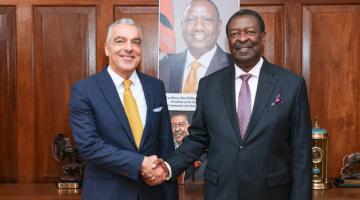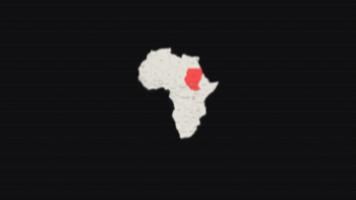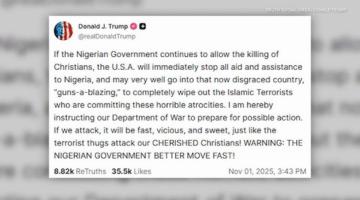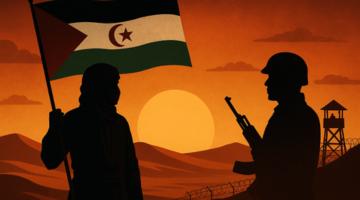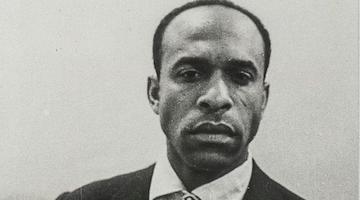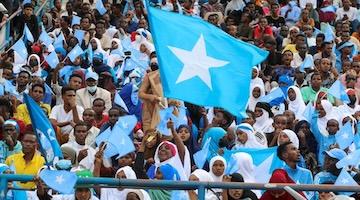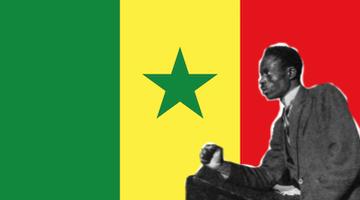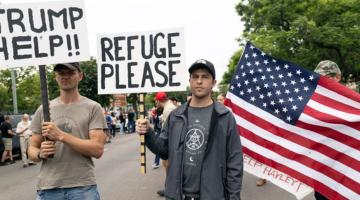All-African People’s Conference held in Ghana, 1958. (Source unknown)
African liberation will not be realized without Pan-African unity and socialism, as Kwame Nkrumah made clear at the founding of the Organization of African Unity, the precursor to the African Union.
Originally published in Towards Freedom.
Sixty years ago, on May 25, Ghana’s first prime minister and president, the anti-colonial revolutionary leader Kwame Nkrumah stood before 31 other heads of African states in the Ethiopian capital of Addis Ababa and declared, “[T]he struggle against colonialism does not end with the attainment of national independence.”
“Independence is only the prelude to a new and more involved struggle for the right to conduct our own economic and social affairs…unhampered by crushing and humiliating neo-colonialist controls and interference.”
“We must unite or perish,” Nkrumah had emphasized, recognizing that while countries across the African continent were “throwing off the yoke of colonialism,” these successes were “equally matched by an intense effort on the part of imperialism to continue the exploitation of our resources by creating divisions among us.”
Nkrumah was speaking at the founding of the Organization of African Unity (OAU) in 1963, striving, alongside other leaders, to build a Pan-Africanist vision of a continent united under a common currency, monetary zone, and central bank, and a united government and joint defense under an African High Command.
That these conditions did not materialize speaks to imperialism’s “intense effort” to suppress this vision. The coming decades would see African leaders assassinated and overthrown in coups backed by colonial powers for daring to envision a life of dignity for their people. Meanwhile, international financial institutions, dominated by these very forces, implemented brutal regimes of structural adjustment, sinking African countries further into debt and exploitation.
While the OAU eventually became the African Union (AU) and the African Liberation Day became Africa Day, May 25 still serves as a crucial day for progressive forces to connect the struggles for national liberation and Pan-Africanism of the 20th century to the present struggles against imperialism.
On this theme, Pan African Television hosted a discussion titled, “African Liberation Day: The State of the Struggle for Freedom” on May 25.
Recovering the History of Collective Liberation
The general secretary of the Socialist Movement of Ghana (SMG), Kwesi Pratt Jnr. added, “The national liberation struggle is not over…even if that struggle was over… what about the ownership and exploitation of our resources for the sole purpose of enriching the bank accounts of the multinational corporations in the colonial metropolis?”
“The radical nature of this celebration [of African Liberation Day] is saying that we as African people came together to end exploitation…end colonialism…to continue to strive for stopping neocolonialism from taking its root on the African continent. That struggle is still ongoing,” said Kambale Musavuli, a leading activist and an analyst with the Center for Research on the Congo-Kinshasa.
“In some parts of the African continent, people still do not have independence…The people of Western Sahara are still under colonialism by Morocco. We have to make sure that they are liberated.”
African Liberation Day also recognizes that people across Africa threw off the yoke of imperialism through collective struggles. Dr. Vashna Jagarnath, a labor activist and director of Pan Africa Today, commented. “We all know the struggles we face 60 years later, we have been recolonized in different ways, through the debt crisis, through foreign policy, through military bases being allowed to be built on our continent and determining to us who it is we can have relationships with, that determine our local policy…”
“Our continent is in a crisis. So we need to recall our history of us liberating ourselves.”
The Addis Ababa meeting of 1963 had been decades in the making, preceded by the Pan-African Congress held in Manchester, UK, in 1945 and the All-African People’s Conference in Ghana in 1958. However, these initiatives were also built on hundreds of years of struggle by the African people for freedom, “a part of the long march” from the days of the transatlantic slave trade, Pratt stressed.
This long history of liberation struggles and their collectivist orientation is not widely known by young people across Africa today, Musavuli said, calling this an “erasure of history.”
In reality, collectivism had closely informed the period of the struggle for independence for the DRC, and this took various forms—including the support provided by other African countries like the Central African Republic to the DRC. We must remember the fact that Pan-African activist T. Ras Makonnen had helped to get Patrice Lumumba to Ghana in 1958 and how the Mau Mau had gone from village to village in the country and screened films in 1960, Musavuli highlighted.
“The independence of Congo was not a national affair, it was a continental affair…We cannot talk about June 30 as Congolese independence, it was a Pan Africanist independence,” he said, reiterating the need for unity and a “Pan Africanism of the people.”
Internationalist Oppression, Internationalist Resistance
Speaking to the historic erasure of these links in the context of South African exceptionalism, Jagarnath said, “You are taught about the South African economy as if it is divorced from the rest of Africa, as if South Africa, which is a resource-rich country, is rich on its own, as if it was not migrant labor workers from Mozambique, Zimbabwe, and Malawi working in our mines, without getting any compensation, to enrich the elites of our country.”
Even today, “for the South African capitalists who are exploiting and benefiting from Ghana… Why must they worry about the liberation of Ghanaians? They don’t need to tell Africans the role of Ghana in the history of our liberation… That is a dangerous story that will affect their profits.”
At a time when African Liberation Day is barely celebrated on the continent, including in Nkrumah’s own country of Ghana, Jagarnath noted that the reason was because the “political project had changed”.
“We as people give up our power to those in power and we let them dictate to us, and they change, and the changes that come into place are economic and political…they do not want us to be liberatory because if we have liberatory policies…if we remember the liberatory aspects of our history we will try to liberate ourselves from them, and this is not convenient because they are now making deals with each other to continue to exploit this continent.”
“So we have two sets of exploitation: the classical imperial exploitation that still comes from the imperial nations, but we also have our internal systems.”
It is this very nature of exploitation that determines that the form of struggle must be internationalist: “The struggle for national liberation in Africa has always been an internationalist effort,” Pratt said. He elaborated that this was due to the fact that the very division of Africa had been an internationalist effort, namely the Berlin Conference of 1884-1885, when colonial powers partitioned the African continent among themselves for the purposes of extraction and exploitation.
“Our enemies are united, and we have no chance of succeeding against that united force if we [ourselves] refuse to unite,” he said. There is a rich history of this internationalist unity, not just within the continent. Cuban revolutionary Che Guevara set up a camp in Ghana to train fighters who were engaged in parts of Eastern Africa and South Africa. The internationalist unity was also reflected in Cuba’s armed support in the fight against apartheid and the consolidation of the independence of Angola and Namibia, Pratt added.
We can also see this in the connected struggles for Black liberation in the United States and the liberation against imperialist oppressors on the African continent, stated panelist Makayla Marie, a member of the Party for Socialism and Liberation in the United States.
Internationalism remains a necessity today, the panel discussion emphasized, “You cannot support the independence of the Sahrawi Arab Democratic Republic without supporting the struggle of the Palestinian people for national independence against apartheid colonial occupation,” Pratt added.
“What we are fighting is the scourge of capitalism in its worst forms, at this imperialist stage, and we need to unite as African people…as socialists…as revolutionaries to achieve victory, which is inevitable.”
This was also underscored by Musavuli in the case of the Democratic Republic of Congo (DRC), where “it is not just imperialists but also other African countries, who are exploiting the country … They are only able to do it because they see the DRC as separate. They do not see us united in the struggle.”
These issues inevitably lead to a key issue that the panelists addressed—that of a general crisis of political legitimacy of current governments and of the use of divisive politics which worked to obscure the common reality “that we are all oppressed by the same oppressor,” as Marie said.
“People, be it in the U.S. or the African continent, have a difficulty right now choosing their leaders, and they must unite and challenge the forces that be,” Musavuli stated. This necessitates the need for mass-based and mass-led collective struggles for a “true independence,” the panelists reiterated.
“These Western countries after colonizing us, enslaving us, and stealing our resources, are now coming back to us and telling us that if we want to develop, we have to be like them and follow the capitalist path to development. That path started from slavery, passed through classical colonialism, and has today arrived at neocolonialism,” Pratt said.
“We have arrived at a situation in history where the only viable option available to us is the self-reliant path to development, the ownership of our resources for our own development… and that option inevitably leads us to the path of socialism.”
“Socialism is the only path to liberation from exploitation, from oppression, from poverty.”
Tanupriya Singh is a writer for Peoples Dispatch.

